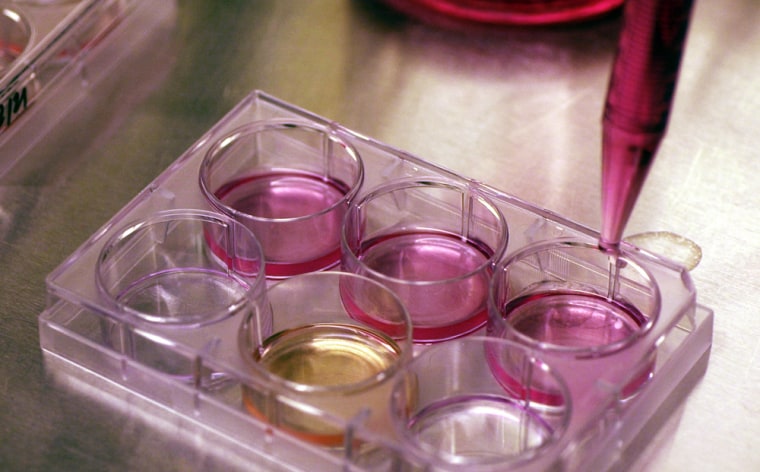No matter what your ethnic background is, you have probably heard the word "chutzpah," a classic Yiddish term. A good way to explain the meaning of this word is that chutzpah is like murdering your parents, then throwing yourself on the mercy of the court and claiming to be an orphan.
Chutzpah is very much on display these days among those defending President Bush’s position on stem-cell research. They are howling in print and through the airwaves that proponents of stem-cell research are not treating the moral issues involved with appropriate seriousness and complexity. But what they are really trying to do is neutralize a topic that could otherwise prove costly to Bush in the election.
Stem-cell research, for those of you who zone out at the mere mention of a scientific subject or have been spending your waking hours over the past three years tracking the marriage status of Jennifer Lopez, can refer to both adult stem cells and embryonic stem cells.
Adult stem cells exist in your body to repair or regenerate damaged cells. Think bone marrow, which constantly makes new blood cells, or the cells that grow more skin when you get a cut.
In contrast, embryonic stem cells can only be found in human embryos. Embryonic stem cells have the ability to turn into all kinds of cells, including some that the adult human body cannot make on its own, such as brain or spinal-cord cells, or that an adult body can make but only very slowly, such as heart-muscle cells.
To get an embryonic stem cell, scientists need to have access to an embryo outside a woman’s body. The embryo is not allowed to develop for more than a few days. At this point, researchers isolate and remove the stem cell from the embryo. In the process, the embryo is destroyed. And this is why human embryonic stem-cell research is so controversial.
A mockery of moral issues
Charles Krauthammer, a member of the President's Council on Bioethics, whined in an Aug. 16 column in Time magazine that “the way Democrats have managed to caricature and debase the debate over embryonic stem-cell research stands in a class by itself."

Meanwhile, Sen. Bill Frist, R-Tenn., Bush’s doctor on call in Congress, thunders "shame" on the critics of the president for misconstruing Bush's position on embryonic stem-cell research by saying that the president opposes all of it. Even first lady Laura Bush has jumped on the bandwagon, complaining that "My dad died of Alzheimer's and to hear people say that cures are right at our fingertips — it's just not right."
Now, friends — Mr. Krauthammer, Sen. Frist and the first lady are all guilty of chutzpah. Although they would like you to believe otherwise, it is the defenders of the president’s ban on funding for embryonic stem-cell research who make a mockery of the moral issues involved. And in trying to defend Bush's position, they are defending a policy that makes little ethical sense to most Americans.
Bush's 'compromise'
True, Bush did not wake up one day and decide to oppose stem-cell research. Indeed, as his outraged defenders note, he thought about it — for a few weeks. The president consulted with various ethics experts, albeit a majority opposed to stem-cell research, and then came to a decision.
On Aug. 9, 2001, in his first major speech to the American people, Bush announced that he had settled on what he called a "compromise" with respect to embryonic stem-cell research. No more embryos could be destroyed in research funded by the federal government. But, drawing what can only be generously described as an arbitrary moral line, Bush said he would allow research using embryonic stem cells already in existence as of the day of his speech. He said there were more than 60 such stem-cell lines available — and lots of federal money would be available to support research on these cells.
A ban is a ban
These days, when the president’s decision to ban embryonic stem-cell research is correctly and accurately described as a ban, supporters of the president, such as Krauthammer and Frist, get exceedingly agitated. The president, they insist, compromised. "Use what was around before 2001" is not a ban, they say. And, they self-righteously point out, this president has allocated more funding — nearly $25 million — for embryonic stem-cell research than any other president.
Well, sorry fellas, but prohibiting the expenditure of federal funds on embryonic stem-cell research after August 2001 is a ban. It is a ban of limited scope but a ban it most certainly is.
Moreover, as anyone who has bothered to follow this issue knows, there are nothing like 60 stem-cell lines around. The president did not tell the truth. There are no more than 23. And no credible scientist believes that this number is sufficient to undertake a serious clinical research program on embryonic stem cells.
In addition, the $25 million the president has allocated for embryonic stem-cell research is absurdly low. It's about the same amount of money that has been set aside to study complementary and alternative medicine. The president’s alleged compromise has produced funding on a par with money for studies of St. John’s wort, tai chi and black cohosh root.
To put it another way, the $25 million the president has spent on stem-cell research is about the same amount of federal grant money that a large department of medicine or neurology at a single major medical school might receive in a year or two.
Fuzzy logic
Not only is the president’s compromise nothing of the sort, his moral reasoning, and that of his defenders, is at best obtuse. Consider these points:
- The president says that embryo destruction is wrong, but still allows research on embryos destroyed before August 2001. Huh?
- The president says that embryo destruction is wrong, but does absolutely nothing to prevent the daily destruction of embryos in fertility clinics across the United States. What?
- The president says that embryo destruction is wrong, but fails to tell us whether he really believes that an embryo destined to be destroyed at a fertility clinic but now residing in a Petri dish is morally on par with a child suffering from juvenile diabetes or a person who cannot walk due to a spinal-cord injury. Huh?
- And the president says that embryo destruction is wrong, but does not tell us what he proposes to do about American scientists heading overseas to conduct embryonic stem-cell research in South Korea, Britain, China or Singapore, and then publishing the results in American journals and seeking American patents. Why?
Furthermore, consider Bush's position on cloning for stem-cell research. Using the techniques involved in creating Dolly the sheep, it is possible to create cloned human embryos for use as a source of embryonic stem cells. But the president has done nothing but vigorously try to ban this method for getting stem cells. While it otherwise has little time for the United Nations, the Bush administration is currently devoting much energy to trying to persuade the world body to ban cloning for the purposes of stem-cell research.
Too much hype?
But wait, isn’t it true, as Laura Bush points out, that proponents of embryonic stem-cell research have overhyped it? This is partly true, but every form of scientific research in 21st-century America gets overhyped. If the president’s wife wants to bemoan hype in biomedicine, there are a lot of ad campaigns by pharmaceutical companies that she should add to her condemnation list.
In facing a president who is trying to ban research vital to finding new treatments and cures, is it any wonder that patients and their advocacy groups engage in a bit of hype? And if you are Laura Bush, you must certainly know that your husband’s policy of banning federal funding for stem-cell research is the cruelest thing you can do to patients with incurable diseases.
A political pickle
So what is really going on here? What's going on is that the president’s defenders are in a political pickle that they themselves created.
Bush believes that human life and human rights begin at conception even if conception occurs in a Petri dish. The president and his operatives know that their core base of supporters fervently opposes all forms of abortion and agrees that embryos are people from the moment of conception. They also know that the vast majority of American people do not agree with these views.
So, the Bush administration made a political calculation to use opposition to stem-cell research and cloning as a low-risk stalking horse to advance its anti-abortion agenda and secure support among its most avid anti-abortion constituents.
In addition, Bush's advisors thought that the issue of cloning for embryonic stem-cell research gave them an opportunity they never previously had. By banning all forms of cloning, they hoped to get embryos recognized as people under American law. They gambled that by terrifying the public about the horrors of human cloning and talk of embryo destruction, they could get traction in public policy with respect to abortion.
But this gambit failed. Embryonic stem-cell research and cloning research have drawn huge interest from the biomedical community, the biotechnology industry and, most importantly, from patient advocacy groups and the tens of millions of Americans with serious diseases and ailments.
Bush's current position could prove so unpopular that it might cost him a close election. So suddenly he and his supporters are seeking to recast his position as a compromise, not a ban, and to depict him as a pioneering funder of stem-cell research.
Let’s get past this chutzpah defense and talk turkey. Bush favors a ban on nearly all embryonic stem-cell research. His talk and that of his supporters about compromise is just that — talk.
Whatever your views about the upcoming presidential election, have no doubt about where the candidates stand on this issue — Bush is opposed to stem-cell research, Sen. John Kerry is not.
Arthur Caplan is director of the Center for Bioethics at the University of Pennsylvania.
